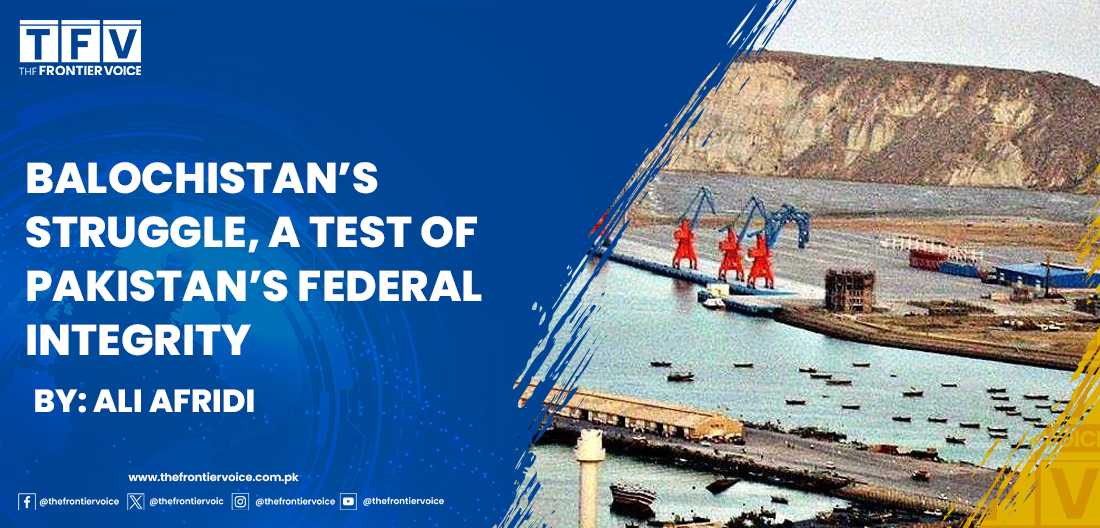POLITICS
Balochistan’s Struggle, A Test of Pakistan’s Federal Integrity

By: Ali Afridi
Balochistan, Pakistan’s largest province by area, is also one of its most troubled. Despite being rich in natural resources, the region suffers from decades of neglect, mistrust, and insurgency, creating a volatile socio-political environment. The ongoing crisis not only undermines the province’s development but also poses a significant threat to Pakistan’s stability. This article explores the historical, political, and economic factors behind the unrest and suggests actionable solutions.
Balochistan’s discord with the federal government dates back to its 1948 accession. The forced integration of the princely state of Kalat led to fears of losing autonomy and control over resources. Subsequent promises of inclusion and development were largely unfulfilled, sparking multiple insurgencies over the decades. These movements have centered around grievances such as unequal resource distribution, lack of political representation, and human rights abuses. Federal attempts at reconciliation, such as the Aghaz-i-Haqooq-i-Balochistan package, have largely failed to deliver meaningful change. Critics argue these measures lack depth and are designed more to quell dissent than to resolve the underlying issues.
Political instability exacerbates Balochistan’s troubles. The resignation of leaders like SardarAkhtarMengal has created a leadership vacuum, allowing insurgent and rights-based groups to gain influence. On the security front, militarized approaches dominate, often alienating local communities. Human rights violations, including enforced disappearances and extrajudicial killings, have further eroded trust in state institutions. Moreover, the lack of parliamentary focus on Balochistan has left critical issues unaddressed, reinforcing the sense of neglect and marginalization among its residents.
Governance failures in Balochistan are evident in its crumbling infrastructure, limited educational opportunities, and inadequate healthcare services. Despite being rich in natural resources, such as natural gas and minerals, the province sees little benefit. For instance, while its natural gas fuels industries across Pakistan, many residents lack access to basic utilities like gas pipelines in their homes. These disparities highlight systemic exploitation and deepen the divide between the province and the federal government. Without equitable resource sharing and sustainable development, efforts at reconciliation are unlikely to succeed.
Civilian leadership and institutions play a minimal role in resolving the crisis. The military’s dominance in governance and counter-insurgency operations has sidelined civilian efforts, creating a power imbalance that hampers progress. Meanwhile, media coverage remains limited, with national outlets underreporting Balochistan’s issues and international coverage focusing solely on insurgency. This selective reporting silences the voices of ordinary citizens and oversimplifies the complex socio-political dynamics at play.
Addressing Balochistan’s crisis requires a comprehensive and inclusive approach. Key steps include initiating inclusive dialogue to engage local leaders, tribal elders, and civil society organizations to address grievances directly; empowering civilian institutions to shift governance responsibilities from the military; prioritizing resource-sharing agreements that benefit local communities and investing in sustainable development; taking immediate action to end enforced disappearances and human rights violations to rebuild trust in state institutions; and encouraging national and international media to amplify local voices and focus on grassroots movements for a more accurate narrative.
The crisis in Balochistan is not an isolated issue but a national challenge that demands urgent attention. Without addressing the root causes of unrest, the divide between the province and the rest of Pakistan will only deepen. However, through sustained efforts toward inclusivity, economic equity, and human rights, Pakistan can pave the way for a peaceful and prosperous Balochistan. This turning point calls for courage, vision, and collective commitment. The time to act is now.
